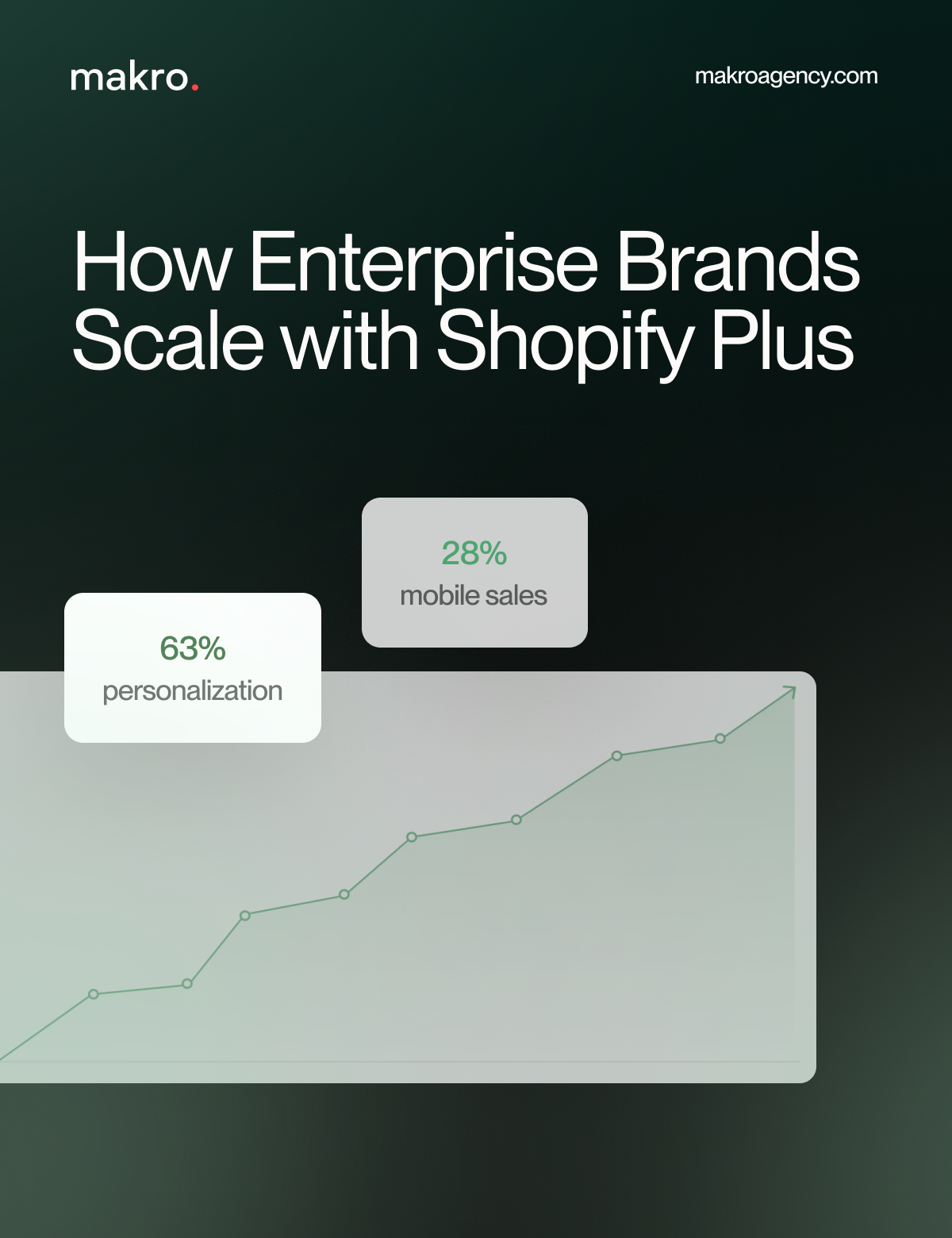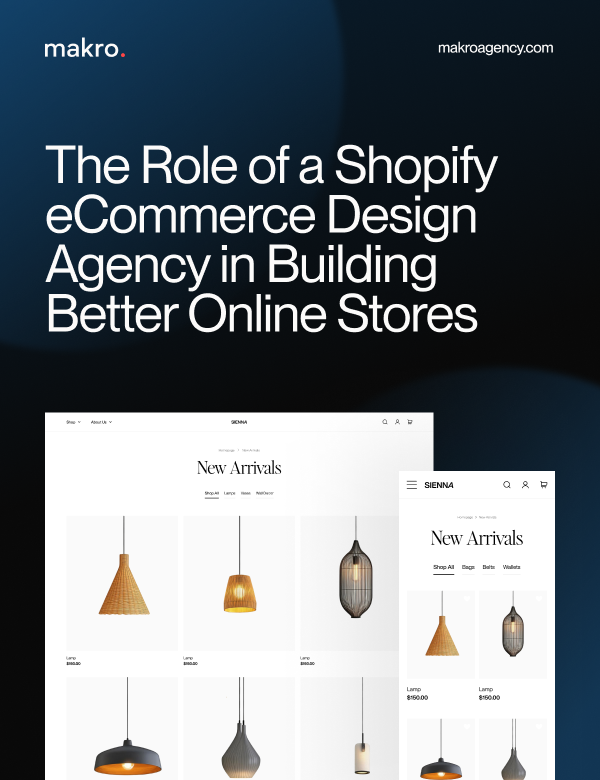B2B vs. B2C on Shopify Plus: Key Differences and Best Practices
For enterprise-level e-commerce businesses, understanding the nuances between B2B (business-to-business) and B2C (business-to-consumer) selling is critical to success. While both models operate on the same Shopify Plus platform, their strategies, functionalities, and customer expectations differ significantly.
As a Shopify Plus Partner, Makro Agency has helped enterprise brands optimize their e-commerce experience for both B2B and B2C audiences. In this blog, we’ll explore the key differences between these models, best practices for each, and how Shopify Plus provides the tools necessary for success.
Key Differences Between B2B and B2C on Shopify Plus
1. Customer Journey & Buying Process
- B2B: A longer, more complex buying cycle involving multiple decision-makers, negotiations, and contract-based pricing.
- B2C: A shorter, more streamlined buying process with an emphasis on impulse purchases, direct transactions, and emotional triggers.
2. Pricing Structures
- B2B: Requires tiered pricing, bulk discounts, and negotiated pricing, often varying by customer type.
- B2C: Standardized pricing with occasional discounts, sales, and promotional offers.
3. Order Volume & Frequency
- B2B: Larger order volumes with recurring purchases and automated reordering options.
- B2C: Typically smaller, one-time orders with opportunities for upselling and cross-selling.
4. Checkout & Payment Terms
- B2B: Custom payment terms (net 30, net 60), invoice-based payments, and options like ACH, wire transfers, and purchase orders.
- B2C: Instant payments through credit cards, PayPal, Apple Pay, and other standard gateways.
5. User Accounts & Personalization
- B2B: Customer-specific portals, personalized pricing, and account-based management for bulk buyers.
- B2C: Guest checkout, loyalty programs, and customer segmentation for personalized recommendations.
6. Marketing & Customer Engagement
- B2B: Relationship-driven marketing using account-based strategies, personalized outreach, and content marketing.
- B2C: Mass marketing strategies focusing on social media, email campaigns, and influencer collaborations.
Best Practices for B2B E-Commerce on Shopify Plus
1. Enable Shopify Plus B2B Features
Shopify Plus offers a suite of B2B functionalities that allow enterprise brands to create a seamless wholesale experience. Utilize features such as:
- Company profiles & custom pricing for different business accounts.
- Volume-based pricing & net payment terms to streamline purchasing.
- Self-serve ordering portals for repeat customers to manage their purchases efficiently.
2. Integrate an ERP for Seamless Operations
A robust ERP (Enterprise Resource Planning) system integration ensures real-time inventory updates, automated invoicing, and better order management, making it easier to handle large-scale B2B transactions.
3. Optimize for Bulk Ordering & Custom Quotes
Providing a quick order form or a custom quote request system allows businesses to streamline bulk purchases without manual intervention.
4. Personalized Customer Accounts & Portals
Enable business customers to log in and view their personalized pricing, previous orders, and shipping preferences, improving efficiency and customer satisfaction.
5. Implement Flexible Payment Options
Since B2B buyers expect payment terms, ensure that your store supports invoice payments, bank transfers, and split payments to accommodate enterprise procurement processes.
Best Practices for B2C E-Commerce on Shopify Plus
1. Leverage Shopify Plus for High-Traffic Scalability
B2C stores experience high traffic volumes, especially during sales events. Shopify Plus ensures 99.99% uptime and can handle thousands of transactions per minute, making it ideal for enterprise-level brands.
2. Optimize Checkout for Conversions
A seamless checkout experience is crucial for reducing cart abandonment. Shopify Plus allows for:
- One-page checkout to streamline the process.
- Shopify Scripts to create personalized discounts and upsells.
- Multiple payment gateways to cater to global customers.
3. Enhance Personalization with AI & Automation
B2C buyers expect a tailored experience. Use AI-powered recommendations, loyalty programs, and marketing automation to engage customers effectively.
4. Maximize Omnichannel Selling
B2C brands thrive when they integrate multiple sales channels, including:
- Social commerce (Instagram, TikTok, Facebook Shops)
- Online marketplaces (Amazon, eBay, Walmart)
- Brick-and-mortar stores with Shopify POS
5. Implement a Strong Retention Strategy
Retaining customers is key to B2C success. Utilize email marketing, retargeting ads, and subscription models to boost repeat purchases.
Choosing the Right Approach for Your Business
Whether your business focuses on B2B, B2C, or a hybrid model, Shopify Plus provides the flexibility and power to scale efficiently. The key is implementing the right features and strategies tailored to your audience’s unique needs.
Scale Your Business with Makro Agency
At Makro Agency, we specialize in building high-performance B2B and B2C Shopify Plus stores that drive revenue and enhance customer experiences. Whether you need a robust wholesale solution, a high-converting DTC store, or a seamless hybrid approach, we’re here to help.
Ready to optimize your Shopify Plus store for maximum scalability and efficiency? Let’s talk. Contact Makro Agency today to get started!











.png)
.png)





















































.png)

.png)



.png)

.png)


